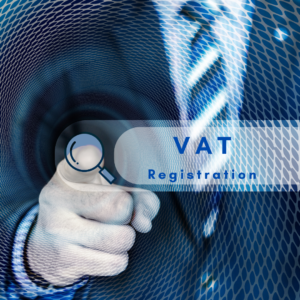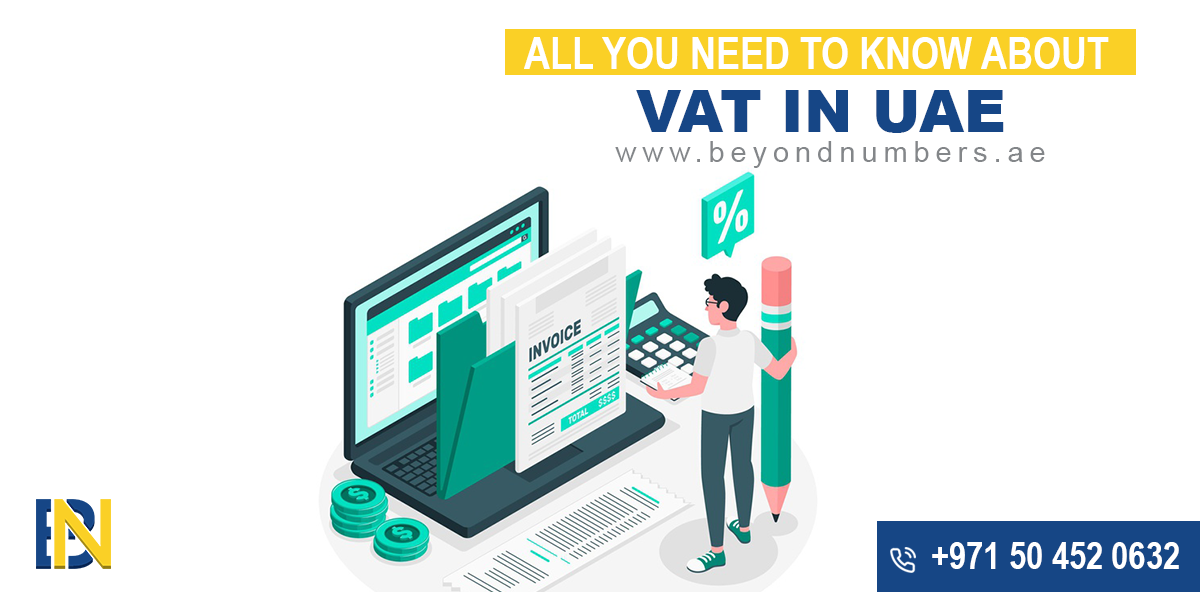Do VAT puzzle you? Here is all you need to Know about VAT in UAE:
What is VAT in UAE:
VAT was introduced by UAE on first of January 1, 2018. VAT is value added tax which is 5% in general but there are zero rated exempted and out of scope which will be discussed further. Important point to remember is that VAT is charged at every point of sale and finally the end user is the one who pays VAT.VAT is not a cost to the business. The businesses collect VAT and deposit to the federal tax authority (FTA). Only thing that one needs to be careful is cash flow.

Criteria for registering for VAT:
A business must compulsorily register for VAT if it’s sales or taxable supplies and imports exceeds AED 375,000 annually.
However, if the business wants, it can voluntarily register for VAT when the taxable supplies and imports exceeds AED 187,500 per annum.
VAT Registration Process:
To register for VAT, one has to create a login id and password at the FTA website. After you verify your account, you need fill in the form. The documents required are as follows:
|
1. Trade license |
|
2. Certificate of incorporation or registration certificate |
|
3. Article of association/ partnership agreement or any other document showing ownership information about the business. |
|
4. Copy of passport and emirates ID of the manager |
|
5. Details of manager. |
|
6. Copy of passport and emirates ID of the manager |
|
7. Physical office location of the business. |
|
8. Contact details. |
|
9. Bank account details. |
|
10. List other business(es) of the directories/ partners in UAE in last five years along with their trade license copies. |
|
11. Declaration about: |
|
· Business activities of the applicant |
|
· Actual or estimated financial transaction values |
|
· Turnover in last 12 months with supporting document |
|
· Details about expected turnover in next 30 days |
|
· GCC activities of the business |
|
· Details about customs registration |
Is VAT applicable to all business units?
The VAT rate of 5% is applicable for all business units that are established in UAE mainland and freezone. However, there are designated zones for which trade in between them VAT is exempted. Also, there are zero rated and exempted goods on which the VAT rate of 5% does not apply.
Zero Rated goods:
Supplies subject to the zero rate are listed in Article 45 of the Federal Decree-Law no. (8) of 2017 on Value Added Tax, such as:
- Exports of goods and services.
- International transport of goods and passengers.
- Certain means of transport, such as trains, trams, vessels, airplanes.
- First sale/rent of residential buildings.
- Aircraft or vessels designated for rescue and assistance by air or sea.
- Certain investment precious metals.
- Certain healthcare services and related goods and services.
- Certain educational services and related goods and services.
It must be noted that you can claim input VAT on zero rated supplies.
It is compulsory to register for VAT once you cross the threshold of Aed375,000 and most importantly you can claim back input VAT.
Exempted supplies:
Exempt supplies are listed in Article 46 of the Federal Decree-Law no. (8) of 2017 on Value Added Tax, such as:
- Financial services including life insurance and reinsurance of life insurance as well as financial services that are not conducted for an explicit fee, discount, commission, rebate or similar type of consideration.
- Residential buildings, other than the residential buildings which are specifically zero-rated.
- Bare land.
- Local passenger transport.
It must be noted you cannot claim input VAT on exempt goods.
It is not compulsory to register for VAT once you cross the threshold of Aed375,000.
VAT calculation in uae example:
VAT is calculated as 5% on sales (output VAT) less 5% on purchases (Input VAT)
To site and example, suppose you own a restaurant and your monthly sales is Aed100,000/-. The output VAT here will be Aed5,000(100,000 * 5%).
Again, you have purchased goods or made expenditure in your business for Aed50,000. Your input VAT will be Aed2,500 (50,000*5%).
So, the net VAT payable to the government will be Aed2,500 (output VAT 5,000- input VAT 2,500).
What is Output VAT?
Output VAT is the VAT calculated on the sales made. It includes the following:
- Sales made to customers or shop sales (B2C).
- Sales made to other business owners (B2B).
- Goods withdrawn for personal use.
- Goods given to employees at zero or discounted rates.
- Goods given as gifts.
What is Input VAT?
Input VAT is the amount of VAT paid for purchase and expenses made in the course of business.
Conditions for input VAT recovery:
- The purchases are made to make taxable supplies.
- The recipient retains invoices to furnish upon audit.
- The money has been paid for the purchases made.
Expenses that cannot be recovered as input VAT:
It is important to remember that the following are not allowed to be recovered as input tax:
- Entertainment expenses.
- Vehicles expenses used for personal purposes.
- Employee related expenses.
- Supplies used to make exempt goods.
VAT in uae free zones companies:
Free zone companies do not require local sponsorship, they allow hundred percent foreign ownership. There are also attractive benefits allowed to Free zone companies. For VAT purposes only designated zones are “VAT free” for trading between the designated zones. To example goods sold between Jebel Ali Free zone and airport Free zone will be VAT free.
List of Designated Zone in UAE
|
Emirate |
Designated Zone |
|
Abu Dhabi |
Free Trade Zone of Khalifa Port |
|
Abu Dhabi Airport Free Zone |
|
|
Khalifa Industrial Zone |
|
|
Dubai |
Jebel Ali Free Zone (North-South) |
|
Dubai Cars and Automotive Zone (DUCAMZ) |
|
|
Dubai Textile City |
|
|
Free Zone Area in Al Quoz |
|
|
Free Zone Area in Al Qusais |
|
|
Dubai Aviation City |
|
|
Dubai Airport Free Zone |
|
|
Sharjah |
Hamriyah Free Zone |
|
Sharjah Airport International Free Zone |
|
|
Ajman |
Ajman Free Zone |
|
Umm Al Quwain |
Umm Al Quwain Free Trade Zone in Ahmed Bin Rashid Port |
|
Umm Al Quwain Free Trade Zone on Sheikh Mohammed Bin Zayed Road |
|
|
Ras Al Khaimah |
RAK Free Trade Zone |
|
RAK Maritime City Free Zone |
|
|
RAK Airport Free Zone |
|
|
Fujairah |
Fujairah Free Zone |
|
FOIZ (Fujairah Oil Industry Zone) |
Accounting for VAT:
Here is how you can account for your VAT.
- A) Journal entry for Sales:
The following journal to be passed when goods are sold:
|
Trade Receivable A/c (including VAT) |
Debit |
|
Sales A/c (excluding VAT) |
Credit |
|
VAT Payable A/c (output tax) |
Credit |
Example:
Suppose, Jay and Co. sold cosmetics @ Aed1,000 (excluding VAT) to Raj & Co. Ltd. Total sales amount is Aed 100,000. How does Jay and Co. record this transaction? VAT rate is 5%.
Solution:
|
Raj & Co. A/c (Trade Receivable A/c) |
Debit |
105,000 |
|
Sales A/c |
Credit |
100,000 |
|
VAT A/c (Output Tax) |
Credit |
5,000 |
- B) Journal entry for Purchase:
The following journal to be passed when goods are purchased:
|
Purchase A/c (Net Payment) |
Debit |
|
VAT (input tax) |
Debit |
|
Accounts Payable A/c (total amount) |
Credit |
Example:
Suppose, Jay and Co. purchased cosmetics @ Aed500 (excluding VAT) to Shiva & Co. Ltd. Total purchase amount is Aed 20,000. How does Jay and Co. record this transaction? VAT rate is 5%.
Solution:
|
Purchase A/c (Net Payment) |
Debit |
20,000 |
|
VAT Payable A/c (input tax) |
Debit |
1,000 |
|
Shiva & Co. (A/c Payable) A/c |
Credit |
21,000 |
Net VAT payable- 5,000-1,000= Aed 4,000
Filing of VAT Return:
Once you have registered for VAT in the UAE, you are required to file your VAT return and make related VAT payments within 28 days from the end of your tax period. I have attached a link to learn how to file a VAT return. Following points to be remembered while filing your VAT return:
- Sales segregation based on emirates e.g. Abudhabi, Sharjah, Dubai etc is required only when you have a branch there.
- Remember to mention your exports as zero rated sales.
- Do not forget to show the exempt supplies.
- Input VAT claim should be shown in purchases column.
- Remember to report the adjustments related to bad debt relief.
- Ensure that the reverse charge supplies on which you are claiming input VAT are already reported in Box no. 3, 6 and 7 of VAT return Form 201.
- Check every detail before you click the submit button.
VAT Payment:
Channels for paying due tax
Registered businesses must pay their due tax online only through the website of Federal Tax Authority, using one of the following options:
- paying via eDirham or credit card.
- via eDebit. (For Credit or Debit card remember, there is a charge of 2.5%).
- via bank transfer – local transfer- using your GIBAN account. (GIBAN is available on your dashboard).
- via bank transfer – international transfer.
- You can go to any money exchange (e.g. Al Ansar Exchange).
UAE VAT deregistration:
VAT Deregistration in UAE can be done online through federal tax authority website. Businesses and individuals who are registered under Federal Tax Authority (FTA) can de-register from VAT in three situations:
- If their turnover was less than AED 187,500 in the 12 months after registering with the FTA, they must mandatorily apply for the VAT Deregistration.
- If the business stops making taxable supplies then they have to apply for VAT deregistration.
- If the company closes for any reason.
Just to site an example, if a tax registrant applied for Voluntary registration on January 1, 2019 and after 12 months (on December 31, 2019) the business was unable to make taxable supplies more than 187,500, the business shall analyze and evaluate if it’s taxable supplies will exceed within the voluntary threshold (AED 187,500) in the next 30 days (ending January 30, 2020) then they should apply for VAT Deregistration in the next 20 days.
For closure of business VAT de-registration must be applied within 20 days.
Refund of VAT in uae:
A business unit has input VAT more than output VAT, then he has the option to claim VAT refund. He has two options to claim back his refund, they are as follows:
- Taxpayer can claim back VAT refund by filling up the form VAT311.
- The tax payer also has the option of not claiming back the money from federal tax authority. He can adjust the money with his future tax payable or against any fines that is due to him.
After the VAT Return is submitted, you are required to complete the VAT refund application ‘Form VAT311’.
Software for VAT calculation:
There are several software’s available to calculate VAT. Some of them are:
- Tally Erp 9
- Zoho
- Zero
- Quickbooks
- Peachtree
- Wave
You can also maintain VAT in excel. In that case you have to be very careful, when you are recording each transaction. Also, make a backup so that if there is any computer crash or any other system problem you can always recover your data.
Remember you need to keep your finances at least for 8 years.
VAT for visitors in uae:
As per FTA website:
“From 18 November 2018, eligible tourists in the UAE will be able to request refunds on the Value Added Tax (VAT) incurred on their purchases while there are in the UAE. Only tax invoices issued from 18 November 2018 will qualify eligible tourists to reclaim taxes on their purchases.
Planet is the exclusive operator of the tax refund system for tourists which Federal Tax Authority executes in the UAE. Read more about VAT refunds for tourists.
Conditions for tourists to claim their VAT refunds
For a tourist to claim VAT refund on purchases he made in the UAE, he must fulfill certain conditions:
- Goods must be purchased from a retailer who is participating in the ‘Tax Refund for Tourists Scheme’
- Goods are not excluded from the Refund Scheme of the Federal Tax Authority
- He must have the explicit intention to leave the UAE in 90 days from the date of supply, along with the purchased supplies
- He must export the purchased goods out of the UAE within three months from the date of supply
- The process of purchase and export of goods must be carried out according to the requirements and procedures determined by Federal Tax Authority.”
Here are some Frequently asked Question (FAQ) on VAT:
- Can individual register for VAT in uae?
Yes, when an individual rent his property for commercial purpose, he should register for VAT.
- Can we claim VAT on petrol in uae?
VAT on petrol can be claimed provided it is used for business purposes. Any fuel expenses on personal purpose cannot be claimed.
- How VAT in UAE will impact consumers?
VAT will increase the cost of living of the residents of UAE. Even though it is just 5% of the total cost but when added up it will become a big amount. The residents need to be more careful while spending. Employees can always expect to have a pay raise on account of VAT. It depends on the owner of course. There are certain expenses like basic medical expenses and educational sector, which is free of VAT.
- How VAT will impact businesses in uae?
VAT is not a cost to the business; the business owners are just the custodian VAT. As the Government is receiving this money. It is a great source of income to the government. We can expect improved infrastructure and increased GDP.
- VAT in uae construction companies:
Construction of new buildings will be zero rated. The supplier can claim the input tax credit on all the purchases done for the construction activity.
Regarding the construction of new buildings, the following goods and services are zero-rated:
- Construction services relating to new buildings;
- Goods supplied by the person supplying the construction service in the course of constructing a new building.
Construction of a new building includes an extension of an existing building, but excludes other work on existing buildings such as refurbishment, restoration and conversion.
- Can tourist claim VAT in uae?
Yes, the tourists can claim back VAT. The procedure is already explained
If you need help we at Beyond Numbers always there to help you.

